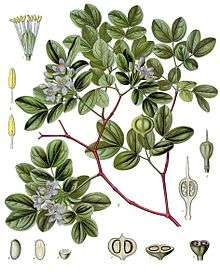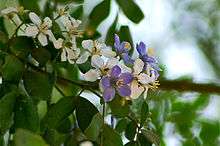Guaiacum officinale
Guaiacum officinale, commonly known as roughbark lignum-vitae,[3] guaiacwood or gaïacwood, is a species of tree in the caltrop family, Zygophyllaceae, that is native to the Caribbean and the northern coast of South America.[2]
| Guaiacum officinale | |
|---|---|
 | |
| Scientific classification | |
| Kingdom: | Plantae |
| Clade: | Tracheophytes |
| Clade: | Angiosperms |
| Clade: | Eudicots |
| Clade: | Rosids |
| Order: | Zygophyllales |
| Family: | Zygophyllaceae |
| Genus: | Guaiacum |
| Species: | G. officinale |
| Binomial name | |
| Guaiacum officinale | |
Description
This small tree is very slow growing, reaching about 10 m (33 ft) in height with a trunk diameter of 60 cm (24 in). The tree is essentially evergreen throughout most of its native range. The leaves are compound, 2.5–3 cm (0.98–1.18 in) in length, and 2 cm (0.79 in) wide. The blue flowers have five petals that yield a bright-yellow-orange fruit with red flesh and black seeds.

Symbolism
Guaiacum officinale is the national flower of Jamaica.[4]
Uses
Guaiacum officinale is one of two species yielding the true lignum vitae, the other being Guaiacum sanctum. Guaiac, a natural resin extracted from the wood, is a colorless compound that turns blue when placed in contact with substances that have peroxidase activity and then are exposed to hydrogen peroxide. Guaiac cards are impregnated with the resin and are used in determining whether stool contains blood. The heme portion of hemoglobin contains peroxidase and will catalyze the oxidation of guaiaconic acid when hydrogen peroxide is placed on the Guaiac card if blood is present in the stool.[5]
Conservation
Roughbark lignum-vitae was listed as an endangered species by the IUCN in 2019. It has been overexploited for its valuable wood and medicinal products. International trade of this species is restricted because of its placement in CITES Appendix II.[1]
References
- Barstow, M. (2019). "Guaiacum officinale". IUCN Red List of Threatened Species. 2019: e.T33701A68085935. Retrieved 2020-08-11.
- "Guaiacum officinale". Germplasm Resources Information Network (GRIN). Agricultural Research Service (ARS), United States Department of Agriculture (USDA). Retrieved 2010-10-03.
- "Guaiacum sanctum". Integrated Taxonomic Information System. Retrieved 2010-10-03.
- "National Symbols". Emancipation & Independence. Jamaica Information Service. Retrieved 2009-01-27.
- "46.2b. Upper Gastrointestinal Bleeding". Walker's Pediatric Gastrointestinal Disease (5th ed.). p. 1285.
External links

